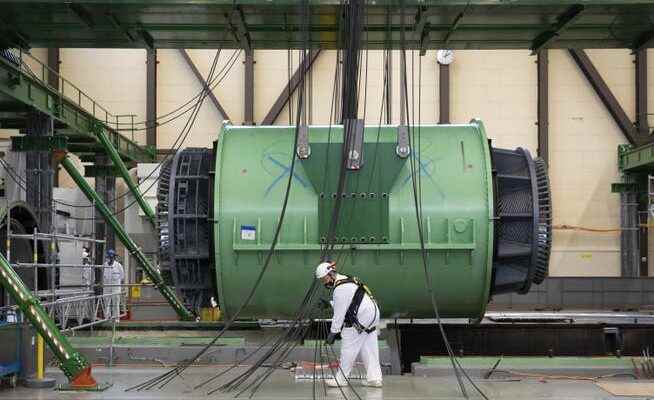In an emergency, the Federal Council has to rely on dirty electricity. The construction of oil power plants should be a wake-up call to accelerate the expansion of renewables. The pressure on landscape protection associations will increase.
Three new replacement power plants are to provide additional power in the magnitude of the shut down Mühleberg nuclear power plant (picture).
One rubs one’s eyes: the energy crisis in Europe is collapsing ideological certainties. The Green German Economics and Climate Protection Minister Robert Habeck feels compelled to reconnect coal-fired power plants that have already been discarded to produce electricity. SP Energy Minister Simonetta Sommaruga now wants to protect Switzerland from widespread power failures with oil-powered power plants. Ideology is of no help in times of need; pragmatic solutions are what is needed. In contrast to gas, crude oil and coal will be readily available in the coming months.
However, the fossil power plants are polluters that contradict the ambitious climate goals of both countries. Habeck admits this openly: The use of coal-fired power plants is bitter, but in this situation it is almost necessary. Energy Minister Simonetta Sommaruga has not (yet) been able to bring herself to make such an admission. On Wednesday, she refrained from explaining the decision of the Federal Council to the public.
Failures of the Energy Strategy 2050
The fact that the government now wants to produce electricity with oil in Switzerland as a last resort shows the failings of the Energy Strategy 2050. Blind faith was placed in replacing the missing domestic capacities with imports during a longer transitional period. That was careless and also not entirely honest. Because the electricity mix that Switzerland imports in winter consists primarily of nuclear, gas and coal power. In addition, politicians have messed up the construction of gas-fired combined cycle power plants, which the energy strategy explicitly provided for. This is now taking its revenge.
Even if the nuclear phase-out decided by parliament and the electorate had never happened, we would still have problems with the supply. The replacement for the Mühleberg nuclear power plant, which was planned before the reactor catastrophe in Fukushima, would have gone into operation in 2023 at the earliest. The electricity company BKW took the old plant offline in 2019 because the security upgrades were no longer worthwhile due to the low electricity prices at the time. In addition, it should also be stated soberly: nuclear power is currently also part of the problem. The prospects for the coming winter would be much better if half of France’s nuclear power plants were not temporarily out of service.
Looking back is certainly important, but it doesn’t generate a single kilowatt hour of electricity for the winter. Sommaruga and the Federal Council recognized the problem – albeit late – and sought short-term solutions. If the three planned reserve power plants are actually implemented, then from February 2023 additional capacity on the order of magnitude of the shut down Mühleberg nuclear power plant will be available in Switzerland. Such a reserve would help to bridge the critical phase until early May when the reservoirs empty. The CO is planned but not yet regulated2-Compensation of the oil power plants.
Oil power plants are the lesser evil
Recourse to climate-damaging oil to generate electricity is the lesser evil than planned or unexpected power outages that would hit the economy and the population hard. But above all it should also be a wake-up call: the energy transition cannot be achieved with the half-hearted expansion of renewables. Landscape and environmental protection organizations should reconsider their position. If they fight every new wind turbine and every increase in the dam wall, Switzerland will simply have too little production capacity to replace the nuclear power plants that are no longer available. Compromises are required. Otherwise they will have to explain to their members that their blockade policy also necessitates the construction of oil and gas power plants.
Homeowners can also contribute. The main incentive here is the price: Thanks to rising electricity prices, photovoltaic systems can be amortized more quickly.
